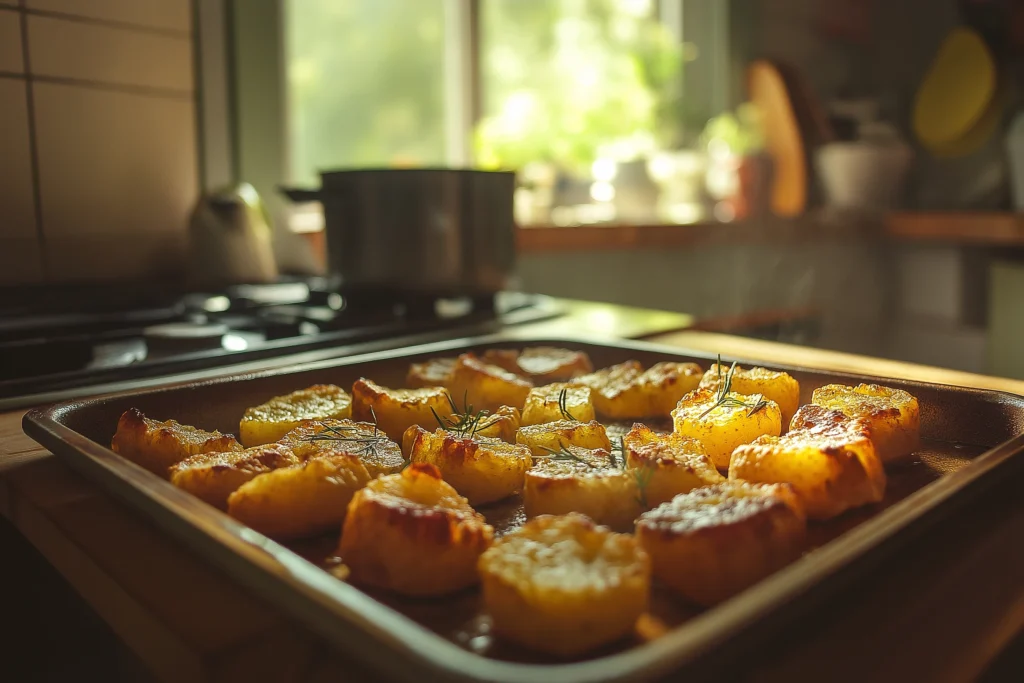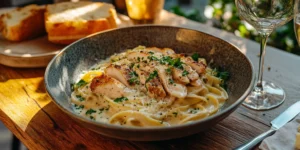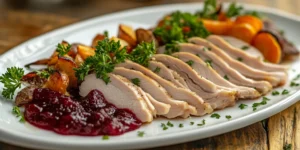When it comes to making roasted potatoes that are crispy on the outside and perfectly tender on the inside, there’s one big question: Is it better to boil potatoes before roasting? If you’ve ever wondered about this popular cooking debate, you’re not alone! In this article, we’ll break it all down and explore why boiling potatoes first could be the ultimate game-changer for your roasted spuds. Spoiler alert: there’s science, texture, and a whole lot of flavor involved.
Why Boiling Potatoes Before Roasting Matters
If you’ve been skipping the boiling step in your potato-roasting process, you might be missing out on the secret to those golden, crunchy edges we all love. Let’s dig into why boiling potatoes before roasting can make such a difference.
Understanding the Science Behind Roasting Potatoes
Roasting potatoes is all about the Maillard reaction—the magical browning process that creates crispy exteriors and deep, nutty flavors. However, achieving that perfect crispiness depends on how much moisture is left in the potatoes. Boiling them briefly before roasting helps remove excess starch and kick-starts the cooking process. With less starch and more even cooking, your potatoes are set up for success in the oven.
Additionally, boiling softens the surface of the potatoes, creating that fluffy outer layer that crisps up beautifully when exposed to high heat. If you skip boiling, you might find that the potatoes stay a bit too firm, leading to uneven roasting.
How Boiling Enhances Texture and Crispiness
Here’s where boiling really shines: it creates the ideal texture. By parboiling, you ensure that the potatoes are partially cooked before they hit the oven. This step not only speeds up roasting but also guarantees a consistent texture from edge to center.
Think of it this way: without boiling, you risk having potatoes that are crispy on the outside but undercooked in the middle. Boiling fixes this by softening the inside just enough while preparing the outside for maximum crispiness.
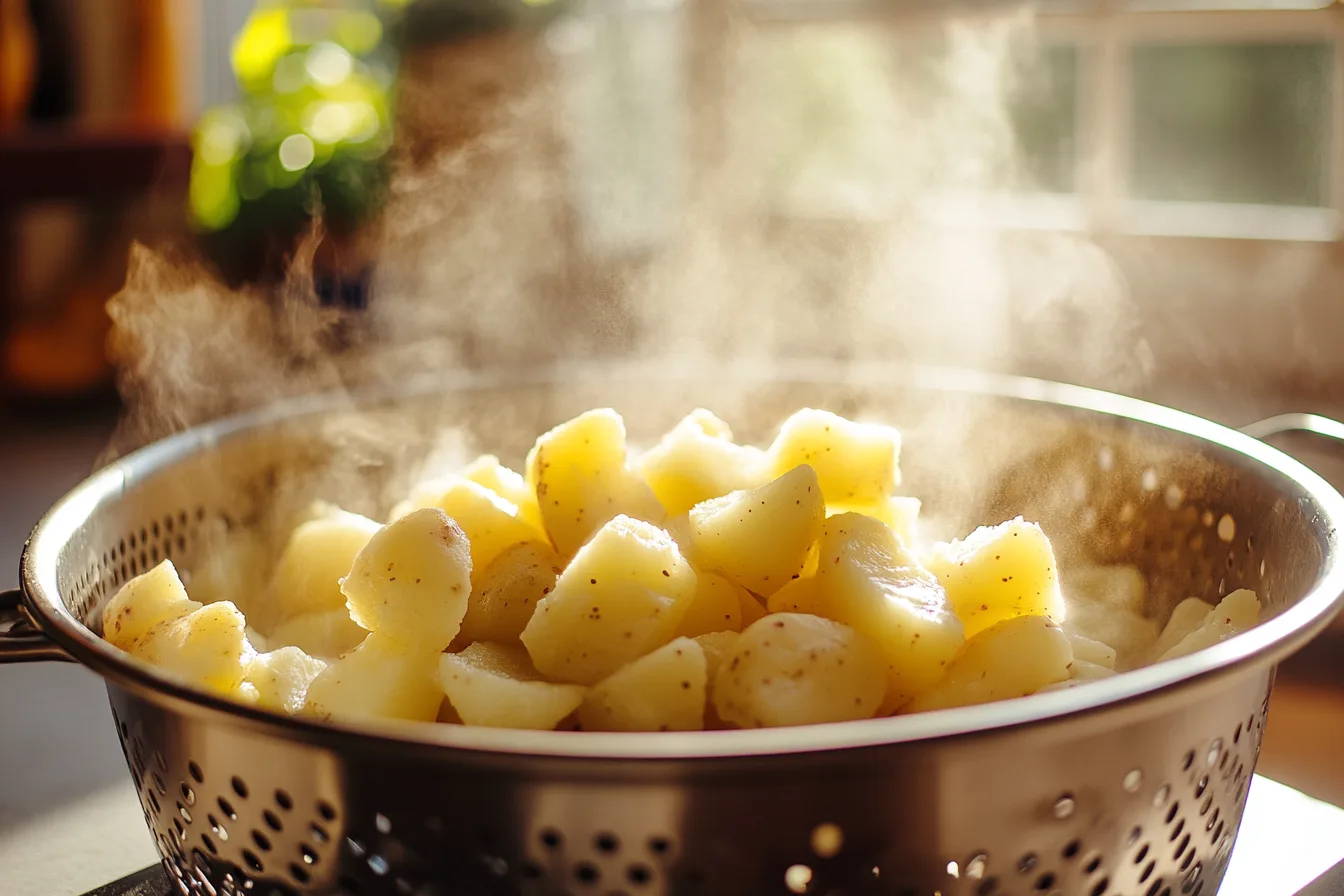
Comparing Boiling vs. Skipping the Boil Step
It’s tempting to skip boiling to save time, but let’s compare the results.
- With Boiling: Potatoes come out golden, evenly cooked, and irresistibly crispy.
- Without Boiling: They often take longer to cook, and the texture can be hit or miss. The outsides may burn before the insides are fully tender.
By investing a little extra time in boiling, you’ll elevate your roasted potatoes from ordinary to extraordinary.
For more on how potatoes compare with other vegetables like broccoli in cooking times, check out Does Broccoli Cook Faster Than Potatoes?.
The Best Way to Boil Potatoes for Roasting
Boiling potatoes before roasting isn’t just about tossing them into a pot of water. To get the best results, there are a few techniques to keep in mind.
Choosing the Right Type of Potatoes
Not all potatoes are created equal when it comes to roasting. For the best results, go for starchy or all-purpose varieties like Russets or Yukon Golds. Russets give you that ultra-crispy exterior, while Yukon Golds strike a nice balance with their buttery flavor and creamy texture.
Avoid waxy potatoes like red or fingerling varieties if you’re aiming for crunch. Their low starch content makes them better suited for recipes like potato salad.
Tips for Perfectly Boiled Potatoes Every Time
Getting the boiling step right is crucial. Start by cutting your potatoes into even pieces. This ensures they cook uniformly, preventing some pieces from being too mushy while others stay undercooked.
When boiling, always start with cold, salted water. Adding potatoes to already boiling water can lead to uneven cooking. The salt in the water not only enhances flavor but also helps the potatoes retain their structure.
Once the water comes to a boil, reduce the heat to a simmer. Boil the potatoes until they’re just tender but not falling apart. You can test this by piercing a piece with a fork—it should slide in easily without the potato crumbling.
How Long to Boil Potatoes Before Roasting
Timing is everything when boiling potatoes. Generally, you’ll want to boil them for about 7-10 minutes, depending on the size of your pieces. The goal is to parboil—not fully cook—the potatoes. They should still be firm enough to hold their shape but soft enough that a fork meets little resistance.
Overboiling can lead to mushy potatoes that don’t roast well, so keep a close eye on them.
Step-by-Step Guide: Boiling and Roasting Potatoes
Now that we’ve covered the basics, let’s dive into the actual process of boiling and roasting potatoes. This step-by-step guide will ensure your potatoes come out perfect every single time.
Prepping the Potatoes: Washing and Cutting Tips
Before anything else, rinse your potatoes thoroughly under cold water to remove any dirt or debris. If you’re using starchy varieties like Russets, you may want to peel them, as their skins can sometimes be tough. However, leaving the skins on adds texture and visual appeal—plus, they’re packed with nutrients!
When cutting the potatoes, aim for uniform sizes. This helps them cook evenly, whether you’re boiling or roasting. Smaller pieces will cook faster, while larger chunks may need extra time.
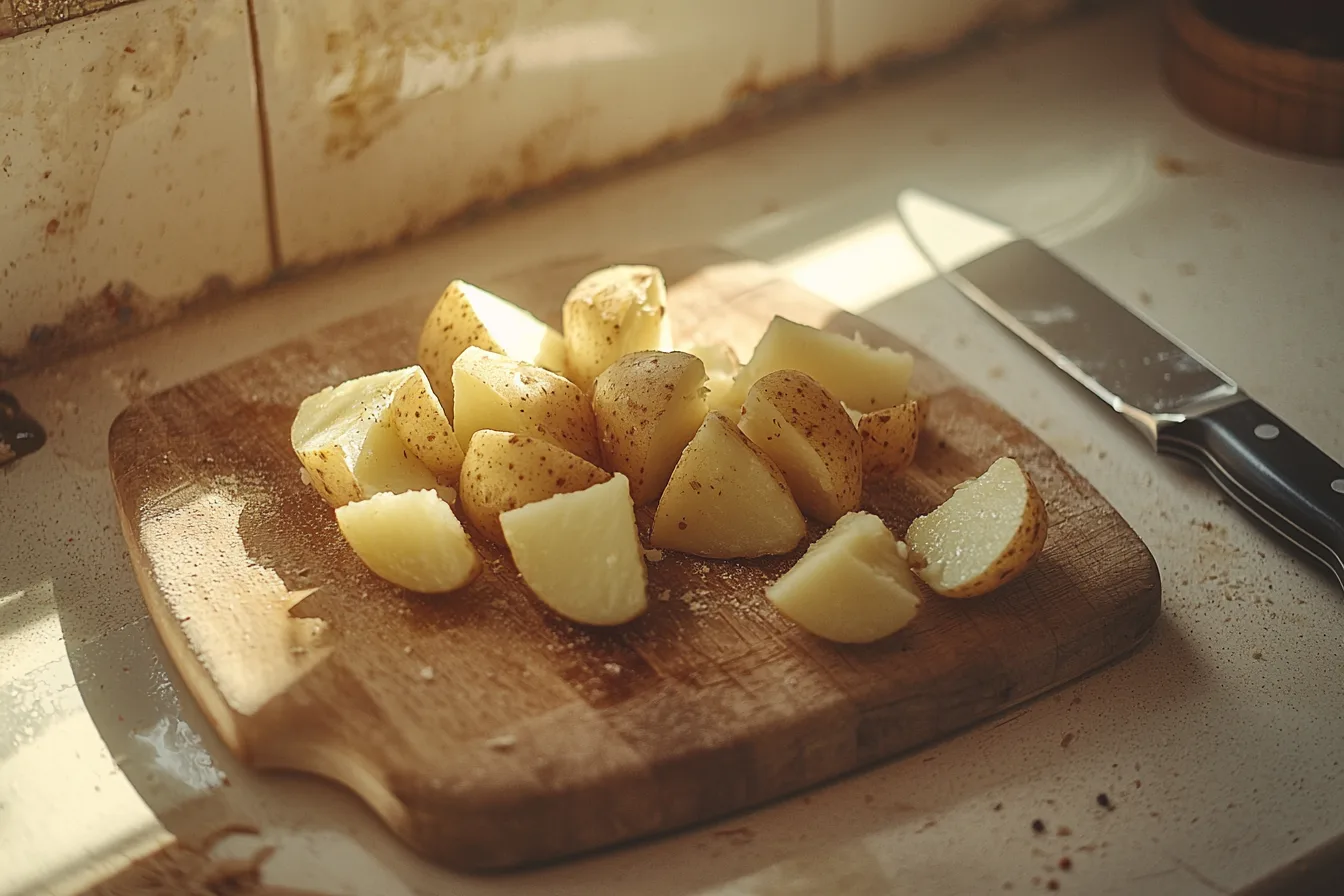
Boiling Potatoes: Key Steps to Follow
Fill a large pot with cold water and add a generous pinch of salt. Place the potatoes in the pot, ensuring they’re fully submerged. Bring the water to a boil, then reduce the heat to maintain a gentle simmer.
Check the potatoes after 7-10 minutes by piercing one with a fork. Once they’re tender but still firm, drain them immediately. Allow the potatoes to cool slightly, letting any residual steam escape. This step is important because excess moisture can interfere with crisping during roasting.
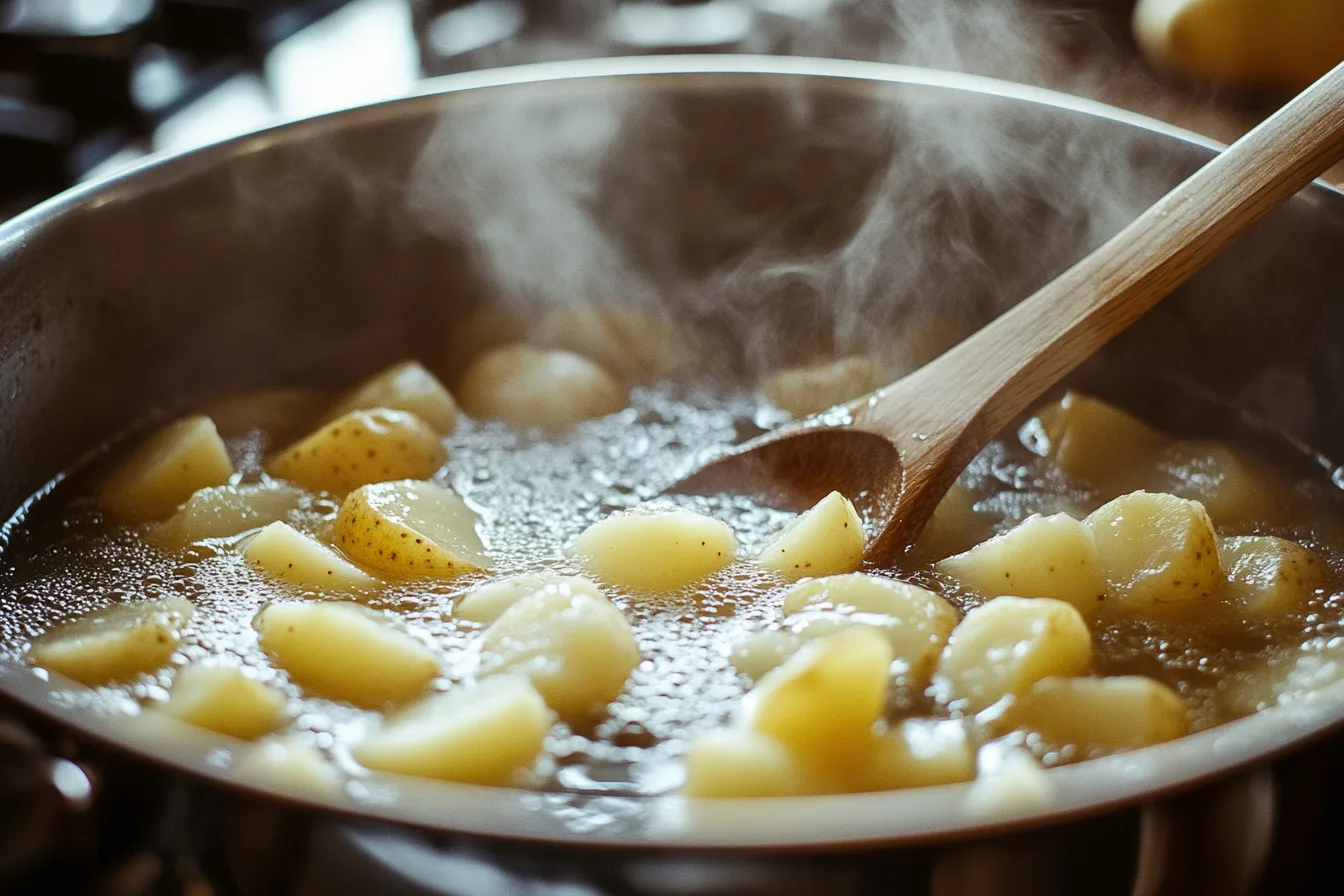
Roasting Potatoes: Techniques for Ultimate Crispiness
To roast the boiled potatoes, preheat your oven to 425°F (220°C). While the oven heats, toss the potatoes in a generous coating of oil—olive oil works beautifully here—and season them with your favorite spices. Think garlic powder, paprika, rosemary, or thyme for extra flavor.
Spread the potatoes out on a baking sheet, making sure they’re not crowded. Overcrowding traps steam and prevents the potatoes from crisping properly. Roast for 30-40 minutes, flipping the pieces halfway through for even browning.
By the end of this process, your boiled and roasted potatoes will be crispy, golden, and absolutely irresistible.
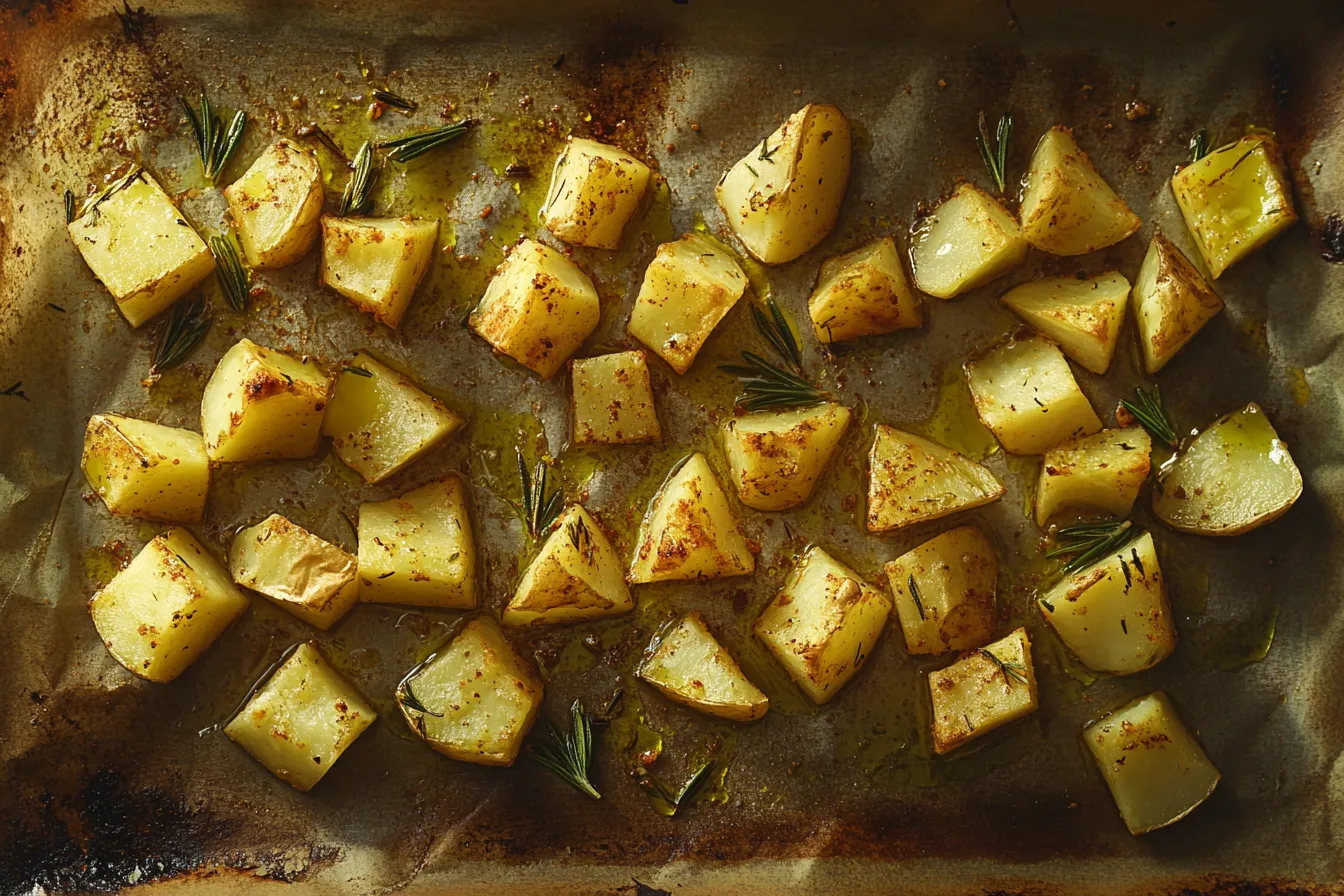
Do You Always Need to Boil Potatoes Before Roasting?
Now that we’ve explored the benefits of boiling potatoes before roasting, let’s address a common question: is boiling always necessary? While boiling can elevate the texture and crispiness of your roasted potatoes, there are instances where you might skip this step without sacrificing too much.
When Skipping the Boil Makes Sense
Although boiling potatoes before roasting typically yields the best results, there are exceptions to every rule. For example, if you’re short on time, skipping the boil can save precious minutes. However, to make up for the lack of boiling, you’ll need to focus on techniques that ensure your potatoes still cook evenly.
One trick is to cut your potatoes into smaller, uniform pieces. Smaller chunks cook faster and reduce the risk of uneven texture. Additionally, choosing waxy or thin-skinned potatoes like red or fingerling varieties may work better when skipping the boil. These types of potatoes tend to hold their shape and develop a satisfying crunch without the need for pre-cooking.
Recipes That Work Without Boiling Potatoes First
Certain recipes lend themselves to skipping the boiling step entirely. For instance, recipes that require long roasting times, like herbed roasted potatoes cooked at a lower temperature, allow the spuds to cook through without becoming dry.
Another option is to use a combination of steaming and roasting. Covering the potatoes with foil for the first part of roasting traps steam, which helps cook them internally. Removing the foil halfway through allows the potatoes to crisp up on the outside.
Tips and Tricks for the Best Roasted Potatoes
Whether you decide to boil your potatoes before roasting or skip this step, there are several tips and tricks that can help you achieve that perfect golden crispness.
Using Seasonings to Elevate Your Potatoes
Seasoning is where roasted potatoes truly shine. While salt and pepper are staples, don’t stop there. Experiment with a mix of spices and herbs to take your dish to the next level. For example, garlic powder and smoked paprika add depth, while fresh rosemary or thyme creates an aromatic burst of flavor.
To ensure even seasoning, toss your boiled potatoes in oil first, then sprinkle the seasonings. The oil helps the spices stick to the surface, guaranteeing each bite is packed with flavor.
Secrets to Achieving Perfectly Crispy Potatoes
Achieving crispy potatoes isn’t just about boiling; it’s about paying attention to every step. For instance, after boiling your potatoes, let them cool and dry completely. Excess moisture can prevent the surface from crisping, so allowing steam to escape is crucial.
Another trick is to toss your boiled potatoes with a bit of flour or cornstarch before roasting. This creates an extra-crunchy coating. Additionally, using a high-smoke-point oil, like avocado or canola oil, ensures the potatoes can roast at higher temperatures without burning.
Finally, always preheat your baking sheet. A hot surface jumpstarts the crisping process as soon as the potatoes hit the pan, delivering that golden-brown crust more efficiently.
Common Mistakes to Avoid When Roasting Potatoes
While roasting potatoes might seem straightforward, there are a few common mistakes that can lead to disappointing results.
- Overcrowding the Pan: When potatoes are too close together, steam gets trapped, leaving you with soggy results. Always spread your potatoes out in a single layer, ensuring enough space for air to circulate. If you want to learn more tips for getting the best flavor out of potatoes, including soaking before roasting, read Why Soak Potatoes Before Roasting?.
- Not Flipping the Potatoes: For even browning, flip your potatoes halfway through roasting. Skipping this step can leave one side burnt and the other side undercooked.
- Using the Wrong Temperature: Roasting at too low a temperature can dry out your potatoes without crisping them. Stick to a range of 400–450°F (200–230°C) for the best results.
By avoiding these mistakes, you’ll end up with potatoes that are consistently crispy and delicious.
FAQs About Boiling Potatoes Before Roasting
Still have questions about the process? Let’s clear up some of the most common concerns about boiling potatoes before roasting.
- Should I salt the water when boiling potatoes?
Yes! Salting the water is a must when boiling potatoes. It not only enhances the flavor but also helps season the potatoes from the inside out. Be generous with the salt—it should taste like the ocean. - What’s the best oil to use for roasted potatoes?
While olive oil is a classic choice for its flavor, oils with a higher smoke point, like avocado or vegetable oil, are excellent for achieving extra crispiness. If you want to experiment, try duck fat for a rich, indulgent twist. - Can I boil potatoes the day before roasting?
Absolutely! Boiling potatoes ahead of time can be a great way to save time. After boiling, let the potatoes cool completely and store them in an airtight container in the refrigerator. When you’re ready to roast, toss them in oil and seasoning, then pop them in the oven. - How do I store leftovers for the best results?
Leftover roasted potatoes can be stored in the fridge for up to three days. To reheat, place them on a baking sheet in a 400°F (200°C) oven until they’re warmed through and crispy again. Avoid microwaving, as it can make them soggy. - What other vegetables can I boil and roast together?
Many vegetables pair beautifully with roasted potatoes. Try carrots, parsnips, or Brussels sprouts for a colorful, flavorful medley. Just make sure to adjust the boiling and roasting times based on each vegetable’s texture.
